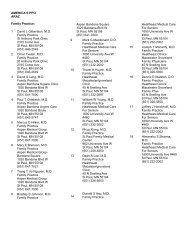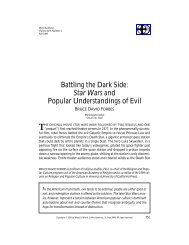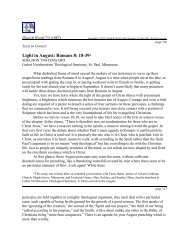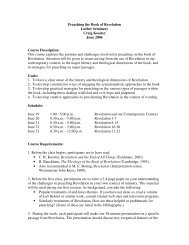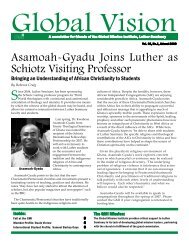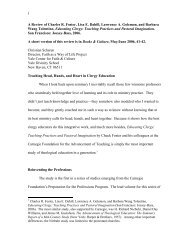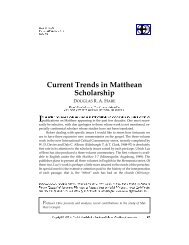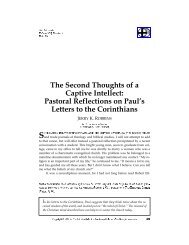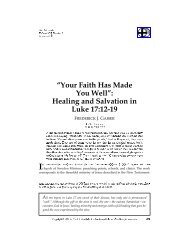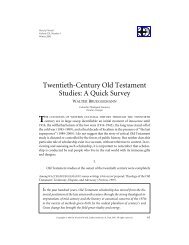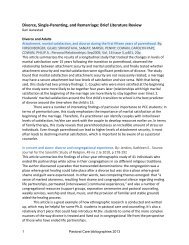The Royal Psalms and Jesus Messiah - Word & World - Luther ...
The Royal Psalms and Jesus Messiah - Word & World - Luther ...
The Royal Psalms and Jesus Messiah - Word & World - Luther ...
You also want an ePaper? Increase the reach of your titles
YUMPU automatically turns print PDFs into web optimized ePapers that Google loves.
<strong>Word</strong> & <strong>World</strong> 5/2 (1985)<br />
Copyright © 1985 by <strong>Word</strong> & <strong>World</strong>, <strong>Luther</strong> Seminary, St. Paul, MN. All rights reserved.<br />
page 192<br />
<strong>The</strong> <strong>Royal</strong> <strong>Psalms</strong> <strong>and</strong> <strong>Jesus</strong> <strong>Messiah</strong>: Preparing to Preach<br />
on a <strong>Royal</strong> Psalm<br />
DELMAR L. JACOBSON<br />
Trinity <strong>Luther</strong>an Church, Mason City, Iowa<br />
Those psalms which are commonly called the royal psalms occupy a special place in the<br />
Psalter <strong>and</strong> in the Bible as a whole. 1 <strong>The</strong>y are special in themselves, conveying as they do the<br />
theology of the Davidic Kingdom (c. 1000-587 B.C.). But clearly they took on a special new<br />
meaning for the Jewish community which survived the collapse of the Davidic Kingdom (587<br />
B.C.). <strong>and</strong> they retained that special meaning for the early Christian community, which<br />
interpreted them in the light of <strong>Jesus</strong> <strong>Messiah</strong>.<br />
In preparing to preach on a royal psalm, then, or on any text which refers to a royal psalm,<br />
the Christian exegete must consider each of three perspectives: 1. the original purpose of the<br />
psalm in the days of the Davidic Kingdom; 2. the messianic interpretation of the psalm following<br />
the demise of the Davidic Kingdom; <strong>and</strong> 3. the New Testament interpretation of the psalm in the<br />
light of the ministry, crucifixion, <strong>and</strong> resurrection of <strong>Jesus</strong> <strong>Messiah</strong>.<br />
I. ROYAL PSALMS IN DAVIDIC CONTEXT<br />
In their original setting the royal psalms depict the unique place of King David <strong>and</strong> his<br />
successors in the faith <strong>and</strong> life of the people of Israel. Each Davidic king is understood to be<br />
anointed as the earthly viceroy of Israel’s true king, Yahweh, the Lord of hosts. Or to put it in<br />
slightly different words, the Davidic monarch is understood to be the royal mediator of the<br />
covenant between God the king <strong>and</strong> the people of Israel.<br />
<strong>The</strong> Lord God was proclaimed as Israel’s king from the beginning of Israel’s existence as<br />
a people. 2 Certainly the covenant at Sinai was a kingly cove-<br />
1<br />
It is generally agreed that the royal psalms include <strong>Psalms</strong> 2, 18, 20, 21, 45, 72, 89, 101, 110, 132, <strong>and</strong><br />
144:1-11. A strong case can be made for including <strong>Psalms</strong> 61, 63, <strong>and</strong> 118. In addition to these, Mowinckel includes<br />
<strong>Psalms</strong> 28, 44, 60, 66, 68, 80, 83, <strong>and</strong> 84 in his list of royal psalms: S. Mowinckel, <strong>The</strong> <strong>Psalms</strong> in Israel’s Worship<br />
(Oxford: Blackwell, 1962).<br />
2<br />
Old Testament scholars such as Walter Eichrodt, Gerhard von Rad, <strong>and</strong> Albrecht Alt would not agree that<br />
Yahweh was proclaimed as Israel’s king “from the beginning of Israel’s existence as a people.” Others such as<br />
Bernhard W. Anderson <strong>and</strong> H. J. Kraus do support this thesis; <strong>and</strong> Martin Buber gives what I consider to be a<br />
convincing argument for the antiquity of Israel’s acceptance of Yahweh as king: M. Buber, Kingship of God, third<br />
edition (New York: Harper, 1967).<br />
page 193<br />
nant in which the several tribes accepted Yahweh as their king for ever <strong>and</strong> ever (Exod 15:18). 3<br />
Why such an obviously political arrangement as “king <strong>and</strong> subject” Why not simply a religious<br />
relationship of “god <strong>and</strong> worshipper” Perhaps because Yahweh is not merely a god in the
eligious sense. Perhaps because the political designation “king” speaks of Yahweh’s leadership<br />
in the total life of the people.<br />
In any case, for the first two hundred years, the form of God’s relationship with Israel was<br />
a covenant between God the king <strong>and</strong> each tribe of Israel; one covenant, but extended to each<br />
tribe, clan, <strong>and</strong> family. It was a form well suited for unifying independent, semi-nomadic tribes<br />
with their king <strong>and</strong> with each other.<br />
<strong>The</strong> covenant form changed about the year 1000 B.C. <strong>The</strong> tribes could no longer maintain<br />
their independence. Threatened by the nations round about them, they were forced to become a<br />
monarchy of twelve tribes united under King David. 4 In this covenant form the people related to<br />
God through their earthly monarch, who was anointed as regent of God the king <strong>and</strong> as trustee of<br />
the people.<br />
<strong>The</strong> theology inherent in this covenant form is preserved primarily in the oracle of Nathan<br />
(2 Sam 7:4-16), in the ancient poem 2 Samuel 23:1-7, <strong>and</strong> in the royal psalms. <strong>The</strong> oracle of<br />
Nathan presents this theology succinctly:<br />
Yahweh initiated <strong>and</strong> sustains the covenant <strong>and</strong> has personally chosen the earthly king<br />
(vv. 8, 11b, 12c, 13b, 15a, 16);<br />
<strong>The</strong> king is to be prince (mediator) “over my people Israel” (v. 8);<br />
<strong>The</strong> king is to be given a unique father-son relationship with Yahweh (v. 14a);<br />
<strong>The</strong> king’s duty is to rule justly in Israel (implication of v. 14b; cf. 2 Sam 23:3 <strong>and</strong> Ps 72)<br />
<strong>and</strong> will be chastised by Yahweh if he does not;<br />
<strong>The</strong> outcome of just rule will be peace in Israel (vv.10-11);<br />
<strong>The</strong> king will be given a great name among the nations <strong>and</strong> victory over his enemies (vv.<br />
9, Ilb);<br />
Yahweh will accept the house built “for my name” by David’s successor (v. 13a);<br />
Yahweh’s covenant with David is eternal (v. 16).<br />
<strong>The</strong> royal psalms recount each element of the Davidic covenant theology presented in the<br />
oracle of Nathan. Three elements are given particular attention in the psalms: 1. the unique,<br />
enduring father-son relationship between Yahweh<br />
3<br />
George E. Mendenhall has shown that the form of the Sinai Covenant has the characteristics of the Hittite<br />
suzerainty treaties of the second millennium B.C., with God relating to the tribes of Israel as did the Hittite king to<br />
the nations subject to him. G. Mendenhall, Law <strong>and</strong> Covenant in Israel <strong>and</strong> the Ancient Near East (Pittsburgh:<br />
Presbyterian Board of Colportage, 1955).<br />
4<br />
<strong>The</strong>re were those who opposed the new arrangement, for both political <strong>and</strong> religious reasons (1 Sam 8:4-<br />
18; 10:17-19). <strong>The</strong>y were afraid the monarchy would lead Israel astray, believing as they did that Yahweh alone<br />
should rule over Israel (cf. Judg 8:22-23).<br />
page 194<br />
<strong>and</strong> the Davidic king (Pss 2:7; 72:1; 89:3-4, 19-37; 132:11-12); 5 2. the king’s mediatorial role in<br />
ruling God’s people justly <strong>and</strong> rightly (Pss 72; 101; cf. Pss 18:20-24; 45:4); <strong>and</strong> 3. Yahweh’s<br />
choice of Zion as an eternal dwelling place (Ps 132; cf. Pss 78:68b-69; 2:6, 110:2).<br />
Each royal psalm seems to have been composed <strong>and</strong> used in the First Temple for a royal<br />
occasion:
For the coronation of a new Davidic king (Pss 2 & 110);<br />
As a song of thanksgiving for a royal military victory (Ps 18);<br />
As a prayer for royal military victory (Pss 20 & 144:1-11);<br />
For the anniversary of the king’s coronation (Ps 21);<br />
For a royal wedding (Ps 45);<br />
As a prayer for a royal reign of justice <strong>and</strong> prosperity (Pss 72; 101; Ps 101 could be the<br />
king’s vow to rule justly);<br />
As a prayer of lament for or by the king (Ps 89; cf. Pss 61; 63);<br />
As a prayer of liturgical thanksgiving led by the king (Ps 118);<br />
As a prayer for the king at a festival of Zion (Ps 132).<br />
II. MESSIANIC INTERPRETATION<br />
<strong>The</strong> messianic reinterpretation of the royal psalm developed as a response to the failure of<br />
the Davidic monarchy. As John Bright has stated so concisely,<br />
<strong>The</strong> kingly ideal (Psalm 72) lay beyond the capabilities of the Davidic dynasty, or<br />
any of its representatives: it was never remotely reality. In time there developed<br />
(<strong>and</strong> first with Isaiah himself: 9:1-7; 11:1-9) the expectation of an ideal king of<br />
David’s line...under whose just <strong>and</strong> beneficent rule all the promises would be<br />
fulfilled. But that hope, too, was disappointed: no such ideal Davidide appeared;<br />
the dynasty ended, <strong>and</strong> the temple lay in ruins. Yet hope was not ab<strong>and</strong>oned. Ever<br />
it looked ahead, beyond tragedy, frustration, <strong>and</strong> despair, for the coming of a<br />
King, the Anointed One, the <strong>Messiah</strong>, who, endowed with God’s power, would<br />
bring victory <strong>and</strong> peace to his people <strong>and</strong> establish God’s kingdom on earth. 6<br />
<strong>The</strong> evidence for this persevering messianic hope is two-fold: 1. the writings of the exilic <strong>and</strong><br />
post-exilic prophets; <strong>and</strong> 2. the retention of the royal psalms in the Psalter, “the hymnbook of the<br />
Second Temple.” 7<br />
<strong>The</strong> prophets in particular could not imagine that God would fail to fulfil the promises<br />
given through the Davidic covenant. <strong>The</strong>refore, in spite of the<br />
5<br />
Though the Davidic king was called God’s son in this covenant arrangement, he was never considered<br />
divine in Israel. He was God’s son by adoption (Ps 2:7); chosen to serve God for the sake of the people (cf. Ps 72).<br />
6<br />
John Bright, <strong>The</strong> Authority of the Old Testament (Nashville: Abingdon, 1967) 223.<br />
7<br />
In its present form the Psalter dates from the late sixth century B.C. <strong>The</strong> Psalter is often called “the<br />
hymnbook of the Second Temple,” the temple built under the influence of Zerubbabel in the years 520-515 B.C.<br />
page 195<br />
shortcomings of each Davidic king <strong>and</strong> the total collapse of the monarchy, they announced that<br />
God would restore a remnant of Israel to worship God on Mt. Zion, 8 <strong>and</strong> that God would raise up<br />
a new descendant of David who would faithfully “execute justice <strong>and</strong> righteousness in the l<strong>and</strong>.” 9<br />
<strong>The</strong>re can be little question that the royal psalms were included in the Psalter because<br />
they were understood to be messianic. <strong>The</strong> very structure of the final form of the Psalter supports<br />
this thesis. As Bernhard W. Anderson has written,
It is not accidental that the Psalter in its present form opens with two key psalms:<br />
Psalm 1, which extols the virtue of meditating on the Law (Torah); <strong>and</strong> Psalm 2,<br />
which was regarded in the late Old Testament period as referring to the <strong>Messiah</strong><br />
(literally, “the Anointed One”). <strong>The</strong>se two themes—the revelation of God’s will in<br />
the Torah <strong>and</strong> the hope for the coming of the <strong>Messiah</strong> to inaugurate God’s<br />
kingdom—constituted the two cardinal beliefs of the Jewish people at the time the<br />
Psalter was given its final form. 10<br />
Indeed, the evidence suggests that these themes were “cardinal beliefs of the Jewish<br />
people” even before the final form of the Psalter. Claus Westermann has shown that an earlier<br />
edition of the Psalter began with Psalm 1 (a Torah psalm) <strong>and</strong> ended with Psalm 119 (a Torah<br />
psalm). 11 If we identify Psalm 118 as a royal psalm, along with Mowinckel <strong>and</strong> others, it means<br />
that earlier edition of the Psalter was bracketed by the twin themes of “studying God’s will<br />
through the Torah” <strong>and</strong> “looking for God’s redemption through the <strong>Messiah</strong>” (<strong>Psalms</strong> 1 <strong>and</strong> 2—<br />
<strong>Psalms</strong> 118 <strong>and</strong> 119). 12<br />
III. NEW TESTAMENT REINTERPRETATION<br />
It is clear that <strong>Jesus</strong> refused to apply to himself the common underst<strong>and</strong>ing of <strong>Messiah</strong> as<br />
a powerful warrior king who would reestablish the glory of Israel with the sword. He avoided<br />
using the title <strong>Messiah</strong>. When Peter confessed him to be the <strong>Messiah</strong>, he urged his disciples to<br />
speak of it to no one. According to the synoptic Gospels, when otherworldly spirits recognized<br />
him as God’s Anointed One, he comm<strong>and</strong>ed them to keep silence. And according to the Fourth<br />
Gospel, when he had fed the five thous<strong>and</strong> with five barley loaves <strong>and</strong> two fish <strong>and</strong> they<br />
attempted to make him king, “<strong>Jesus</strong> withdrew again to the hills by himself” (John 6:15).<br />
Certainly <strong>Jesus</strong> did not measure up to the messianic expectations of the religious leaders<br />
of his day. Nor, according to Matthew’s Gospel, did he conduct himself as John the Baptist<br />
expected the <strong>Messiah</strong> to act (Matt 11:2-3). As Millar<br />
8<br />
Jeremiah 31:6, 12; 50:4-5; Ezekiel 34:26; 37:26-28.<br />
9<br />
Jeremiah 23:5-8; 33:14ff; Ezekiel 34:22ff; 37:24-28; Zechariah 9:9-10; cf. Micah 5:1-7.<br />
10<br />
Bernhard W. Anderson, Out of the Depths (Philadelphia: Westminster, 1983) 22-23.<br />
11<br />
Claus Westermann, Praise <strong>and</strong> Lament in the <strong>Psalms</strong>, (Atlanta: John Knox, 1981) 252-253.<br />
12<br />
It is interesting to observe that certain royal psalms are placed ‘in the seams’ of the final edition of the<br />
Psalter. Two royal psalms st<strong>and</strong> last in ‘books’ of the Psalter: Psalm 72 at the end of Book II; Psalm 89 at the end of<br />
Book III. Two royal psalms st<strong>and</strong> between earlier collections of psalms: Psalm 101 between <strong>Psalms</strong> of Yahweh’s<br />
Kingdom (Pss 92-99) <strong>and</strong> a collection of praise psalms (Pss 103-107); Psalm 110 between two collections of praise<br />
psalms (Pss 103-107) <strong>and</strong> (Pss 111-117). It is almost as if the last editors of the Psalter had a messianic strategy for<br />
placing these psalms as they did. In any case, the final form of the Psalter does have a messianic outlook.<br />
page 196<br />
Burrows has put it, “<strong>Jesus</strong> was so unlike what all Jews expected the son of David to be that his<br />
own disciples found it almost impossible to connect the idea of <strong>Messiah</strong> with him.” 13 On top of<br />
all that he died a shameful death on a cross.<br />
Why, then, do Matthew, Mark, Luke, <strong>and</strong> the other New Testament authors identify <strong>Jesus</strong><br />
as the <strong>Messiah</strong> Because of the Resurrection, no doubt. Because, looking back from the<br />
perspective of the Resurrection, they understood the ministry of <strong>Jesus</strong> to be a fulfilment of the
essential work of the <strong>Messiah</strong>: defending the poor, undergirding the weak, delivering the needy<br />
(cf. Ps 72). Because, as Luke’s Gospel testifies, the resurrected <strong>Messiah</strong> enabled his followers to<br />
see that his suffering <strong>and</strong> death were just what the scriptures should have led them to expect<br />
(Luke 24:26-27).<br />
<strong>The</strong> authors of the New Testament have an eschatological viewpoint, of course. <strong>The</strong>y<br />
underst<strong>and</strong> that all things are not yet as they should be. <strong>The</strong>y announce that the New Age has<br />
been inaugurated through <strong>Jesus</strong> <strong>Messiah</strong>, <strong>and</strong> that he now rules at God’s right h<strong>and</strong> (cf. Ps<br />
110:1), but that the New Age will be completed only when the <strong>Messiah</strong> returns as victorious<br />
Lord of all.<br />
This remains the faith of the Church to this day. And, at the same time, this remains the<br />
sc<strong>and</strong>al of the Church’s proclamation of <strong>Jesus</strong> as <strong>Messiah</strong>. <strong>The</strong> Crucified One is “a stone of<br />
offence <strong>and</strong> a rock of stumbling” (Isa 8:14) to good Jews <strong>and</strong> Gentiles alike. But to those who<br />
believe, “the stone which the builders rejected has become the chief cornerstone” (Ps 118:22).<br />
IV. REINTERPRETING PSALM 2<br />
Several royal psalms are interpreted as messianic in the New Testament. 14 One of the<br />
more prominent of these is Psalm 2. <strong>The</strong> following comments are based on a study of Psalm 2<br />
from the threefold perspective of: 1. its original purpose during the Davidic Kingdom; 2. its<br />
retention in the Psalter as a messianic psalm; <strong>and</strong> 3. its New Testament usage in the light of the<br />
ministry, death, <strong>and</strong> resurrection of <strong>Jesus</strong>.<br />
I will tell of the decree of the LORD: He said to me, ‘You are my son, today I have<br />
begotten you.’ Psalm 2:7<br />
1. <strong>The</strong> term “sons of God” (plural) is used in the Old Testament to refer to: a. angelic<br />
beings; b. all the people of Israel; or c. some of the people of Israel. In its singular form, the term<br />
is used almost always as God’s personal expression “my son,” <strong>and</strong> always to refer either to the<br />
whole people of Israel, or to David’s descendant, the anointed king of Judah.<br />
13<br />
Millar Burrow, More Light on the Dead Sea Scrolls (New York: Viking, 1958) 68.<br />
14<br />
<strong>Royal</strong> psalms treated as messianic in the New Testament are: Psalm 2:1-2 (Acts 4:25-26); 2:1, 5 (Rev<br />
11:18); 2:7 (Mark 1:11 <strong>and</strong> parallels; Acts 13:33; Hebrews 1:5; 5:5; 2 Peter 1:17); 2:8-9 (Rev 2:26-27; 12:5; 19:15).<br />
Psalm 18:49 (Rom 15:9). Psalm 45:6-7 (Heb 1:8-9). Psalm 89:3-4 (cf. Acts 2:30); 89:19-20 (cf. Acts 13:22); 89:26-<br />
27 (cf. Heb 1:5; Rev 1:5). Psalm 110:1 (Mark 12:36 <strong>and</strong> parallels; Acts 2:34-35; 1 Cor 15:25; Eph 1:20; Col 3:1;<br />
Heb 1:13; 8:1; 10:12-13; 12:2); 110:4 (Heb 5:6, 10; 6:20; 7:11, 17, 21). Psalm 118:22-23 (Mark 12:10 <strong>and</strong> parallels;<br />
Acts 4:11; 1 Peter 2:7); 118:25-26 (Mark 11:9 <strong>and</strong> parallel); 118:26 (Matt 23:39; Luke 13:35; 19:38). Psalm 132:1-5<br />
(cf. Acts 7:46); 132:11 (cf. Acts 2:30); 132:17 (cf. Luke 1:69).<br />
page 197<br />
Referring to the whole people of Israel, God is quoted as saying: “Israel is my first-born<br />
son” (Ex 4:22), <strong>and</strong> again, “When Israel was a child, I loved him, <strong>and</strong> out of Egypt I called my<br />
son” (Hosea 11:1), <strong>and</strong> again, “I am a father to Israel, <strong>and</strong> Ephraim is my first-born son” (Jer<br />
31:9). Speaking of the anointed descendant of David, God says: “I will be his father, <strong>and</strong> he shall<br />
be my son” (2 Sam 7:14), <strong>and</strong> again, “He shall cry to me: ‘Thou art my Father, my God, <strong>and</strong> the<br />
Rock of my salvation,’ <strong>and</strong> I will make him the first-born, the highest of the kings of the earth”<br />
(Ps 89:26-27), <strong>and</strong> in the words of Psalm 2, “You are my son, today I have begotten you.”
This means Israel is chosen to be God’s special people in all the earth, God’s adopted<br />
son. And later it means the successor to David (each gr<strong>and</strong>son, great-gr<strong>and</strong>son, <strong>and</strong> great-greatgr<strong>and</strong>son<br />
who becomes king) is chosen to be God’s earthly prince, God’s adopted son.<br />
From the beginning of Israel’s existence as a nation, the people believed they had been<br />
singled out by God, chosen to be God’s own possession among nations, God’s special child. But<br />
when Israel became a monarchy of twelve tribes under King David, God’s special relationship<br />
with Israel took a new form: a royal covenant with the Davidic king as God’s son <strong>and</strong> anointed<br />
mediator between God <strong>and</strong> the people.<br />
Psalm 2 is a song for a day of coronation. A new descendant of David is being anointed<br />
as God’s son, begotten that day, coronation day. As the earthly prince of the heavenly king, that<br />
descendant of David is endowed with God’s Spirit to be God’s regent to the people of Israel.<br />
But notice, it is Yahweh, the God of Israel, who is exalted in Psalm 2. When the nations<br />
surrounding Israel are pictured plotting against the newly crowned prince, it is Yahweh, the king<br />
of Israel, who laughs. Yahweh is the sovereign. Yahweh has placed the descendant of David on<br />
the throne. Yahweh will preserve him. Yahweh will empower him.<br />
In reality, however, things did not turn out as pictured in Psalm 2. Only David <strong>and</strong> his son<br />
Solomon ruled over a united kingdom of twelve tribes. Only Solomon enjoyed a reign of peace<br />
<strong>and</strong> prosperity, <strong>and</strong> that at the long-term expense of his people’s well-being. None of the<br />
successive Davidic kings achieved the greatness envisioned by the temple songs such as <strong>Psalms</strong><br />
2, 45, 72, <strong>and</strong> 110. Indeed, the day came when the Davidic king himself was broken “with a rod<br />
of iron” <strong>and</strong> the Davidic kingdom dashed “in pieces like a potter’s vessel” for ever. What<br />
remained were the eternal promises of God to the House of David, <strong>and</strong> the hopes of the people<br />
that God would one day raise up a new son of David to restore the kingdom to Israel.<br />
2. “Now it came to pass in those days, that <strong>Jesus</strong> came from Nazareth of Galilee <strong>and</strong> was<br />
baptized by John in the Jordan. And when he came out of the water, immediately he saw the<br />
heavens opened <strong>and</strong> the Spirit descending upon him like a dove; <strong>and</strong> a voice came from heaven,<br />
‘Thou art my beloved son; with thee I am well pleased’” (Mark 1:9-11).<br />
<strong>The</strong> voice from heaven is specific: quoting phrases from Psalm 2 <strong>and</strong> Isaiah 42. “Thou art<br />
my beloved son,” from Psalm 2, is a reference to God’s special relationship to David’s<br />
descendant, the king of Judah. “With thee I am well pleased,” from Isaiah 42, is a reference to<br />
God’s special relationship to God’s<br />
page 198<br />
chosen servant, the people of Israel. Here is something unusual. <strong>Jesus</strong> is designated as <strong>Messiah</strong><br />
<strong>and</strong> Servant. He is called “my beloved son” in his role as the royal son of David, God’s <strong>Messiah</strong>.<br />
He is called “well pleasing” in his role as God’s elect servant, true Israel. Here, through baptism,<br />
<strong>Jesus</strong> is anointed as David’s royal heir. Here, in the Jordan, where Israel first entered the<br />
promised l<strong>and</strong>, the nation is reborn in <strong>Jesus</strong>. He is to be what each of David’s royal descendants<br />
was meant to be: leader of his people; champion of justice; advocate of the poor; defender of the<br />
weak; savior of the oppressed. He is to be what God’s servant Israel was called to be: a light to<br />
lighten the Gentiles; a blessing to the nations; mediator of God’s <strong>Word</strong>; intercessor for<br />
transgressors; bearer of grief; the lamb of God who takes away the sin of the world.<br />
This is a startling turn of events: a new <strong>and</strong> contrary way which leads, not to the smashing<br />
of <strong>Messiah</strong>’s enemies as announced in Psalm 2, but to the astonishment of Israel’s enemies as
announced in Isaiah 52:14-15.<br />
Elie Wiesel, the contemporary Jewish writer, has said, “<strong>The</strong> true <strong>Messiah</strong> does not behave<br />
like a <strong>Messiah</strong>. He does not covet honors or gold. Neither does he reveal what must remain<br />
hidden.” 15 This is an apt description of <strong>Jesus</strong>. He was not what his people were looking for in the<br />
<strong>Messiah</strong>. Not only was his behavior unacceptable to many, in the end be became a sc<strong>and</strong>al to all,<br />
being put to death on a Roman cross.<br />
<strong>The</strong>re is a further use of the declaration “You are my son” (Ps 2:7) in the New Testament.<br />
Its principal use is in the baptismal accounts of the synoptic Gospels to identify <strong>Jesus</strong> as <strong>Messiah</strong>,<br />
<strong>and</strong>, in t<strong>and</strong>em with Isaiah 42:1, to point the way to the Cross (Mark 1:11 <strong>and</strong> parallels). But it is<br />
also used in the transfiguration accounts of the Gospels: an event which is a preview (if not a<br />
portrayal) of the resurrection of <strong>Jesus</strong> (Mark 9:7 <strong>and</strong> parallels). Indeed, it is used in Acts 13:32-<br />
33 to proclaim that, in raising <strong>Jesus</strong>, David’s heir, from death to the place of dominion, God has<br />
fulfilled his eternal promises to the House of David.<br />
Not that the Resurrection overcomes the sc<strong>and</strong>al of the Cross. On the contrary! <strong>The</strong><br />
Resurrected One remains the Crucified One. <strong>The</strong> Resurrection does not cancel out the Cross, but<br />
glorifies it. As the hymn in Philippians, chapter two, expresses it, “...he humbled himself <strong>and</strong><br />
became obedient unto death, even death on a cross. <strong>The</strong>refore God has highly exalted him...”<br />
(Philippians 2:8-9).<br />
God chose what is foolish in the world to shame the wise. God chose what is<br />
weak in the world to shame the strong. God chose what is low <strong>and</strong> despised in the<br />
world, even things that are not, to bring to nothing things that are, so that no<br />
human being might boast in the presence of God.<br />
For Jews dem<strong>and</strong> signs <strong>and</strong> Greeks seek wisdom, but we preach Christ crucified,<br />
a stumbling-block to Jews <strong>and</strong> folly to Gentiles, but to those who are called, both<br />
Jews <strong>and</strong> Greeks, Christ the power of God <strong>and</strong> the wisdom of God. (1 Corinthians<br />
1:27-29, 22-24)<br />
15<br />
Elie Wiesel, Souls on Fire (New York: R<strong>and</strong>om, 1972) 157.



